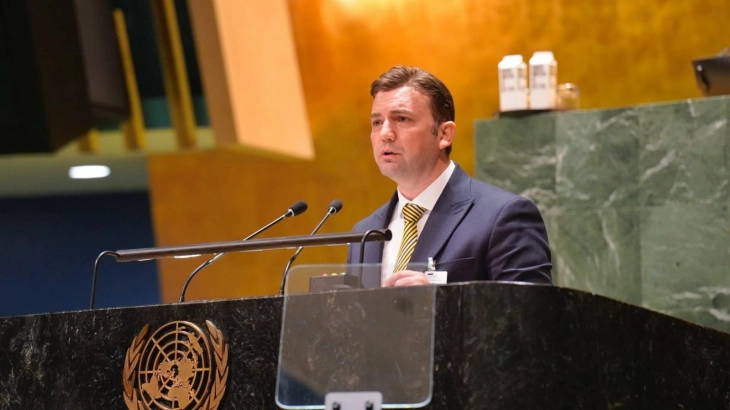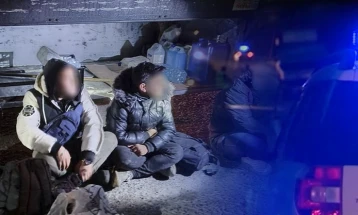Human suffering in Ukraine must stop, Osmani tells UNGA
- OSCE Chairperson-in-Office and Foreign Minister Bujar Osmani addressed the 11th Emergency Special Session of the United Nations General Assembly (UNGA) on Thursday in New York, strongly condemning the Russian Federation’s military aggression against Ukraine.

Skopje, 23 February 2023 (MIA) - OSCE Chairperson-in-Office and Foreign Minister Bujar Osmani addressed the 11th Emergency Special Session of the United Nations General Assembly (UNGA) on Thursday in New York, strongly condemning the Russian Federation’s military aggression against Ukraine.
In his address, Osmani sent a message to all UN member countries about the importance of adopting the UN Resolution on restoring peace and protecting international order and called on all UN member countries to stand in solidarity with Ukraine and its people, and to uphold the UN Charter which is their shared responsibility.
“Today it is Ukraine, tomorrow it could be any of our states that rely on the norms and principles of international law and consider the Charter of the United Nations as the undisputable guarantee for their independence, sovereignty and territorial integrity. The Russian Federation has violated these fundamental principles, which we all cherish and on which we all agree, regardless of differences between us,” said Osmani, as cited by the Ministry of Foreign Affairs.

Osmani pointed out that "spheres of influence" cannot be accepted in the 21st century, noting that it is a concept for causing conflicts, as is the case with Ukraine. He stressed that it is impermissible for a state to forcefully redraw the borders of its democratic neighbor, destroy its infrastructure and cause unbearable suffering to civilian population.
Osmani, reads the press release, said that Russia has chosen the wrong side of history and hence the majority of member states accepted previous UN resolutions, thus condemning the Russian invasion of Ukraine.
“There is no justification for Russia's behavior as a permanent member of the Security Council,” Osmani said. “In addition to launching an aggressive war against Ukraine, Russia has also caused energy insecurity and food shortages in the world.”
The OSCE Chairperson-in-Office conveyed North Macedonia’s position, which is guided by the principles of international law and the UN Charter. “From the beginning, our country condemned the Russian war against Ukraine and, like a large number of UN members, supported the investigation into possible war crimes against the Ukrainian people, and now supports the restoration of peace and the protection of international order.”
Osmani stressed that Russia has violated both theOSCE principles and the Helsinki Final Act. He shared personal testimonies during his field mission to Ukraine.

"I visited Borodyanka near Kyiv and saw the devastating consequences of war. I visited the civilians in the camp nearby and while talking to them I asked myself - what have these innocent civilians, most of them elderly people and children, done wrong to deserve such destiny? We as an international community can do more than humanitarian assistance to alleviate this human suffering. At the end of the day, as the motto of our OSCE Chairpersonship says – It's About People!” Osmani stressed.
He told representatives of the UN member states that political action at national and international level will be meaningless if we remain silent in the face of human suffering that is not caused by natural disasters, but by deliberate military aggression. He underlined that there must be accountability, because accountability today is a moral imperative as it is the most effective means to avoid this happening again, in another place, to another sovereign state, to another people.
“The international community can’t afford that this gross violation of all norms and principles goes without response. Justice and accountability are needed for the sake of the victims, but they are also prerequisites for avoiding further aggressions. What is at stake in Ukraine is no less than a vision of a world we want to live in: either we will secure peaceful coexistence free from menaces of war and aggression, or we will be forced to live in constant fear, instability and uncertainty,” Osmani pointed out.
Photo: MIA/MFA







